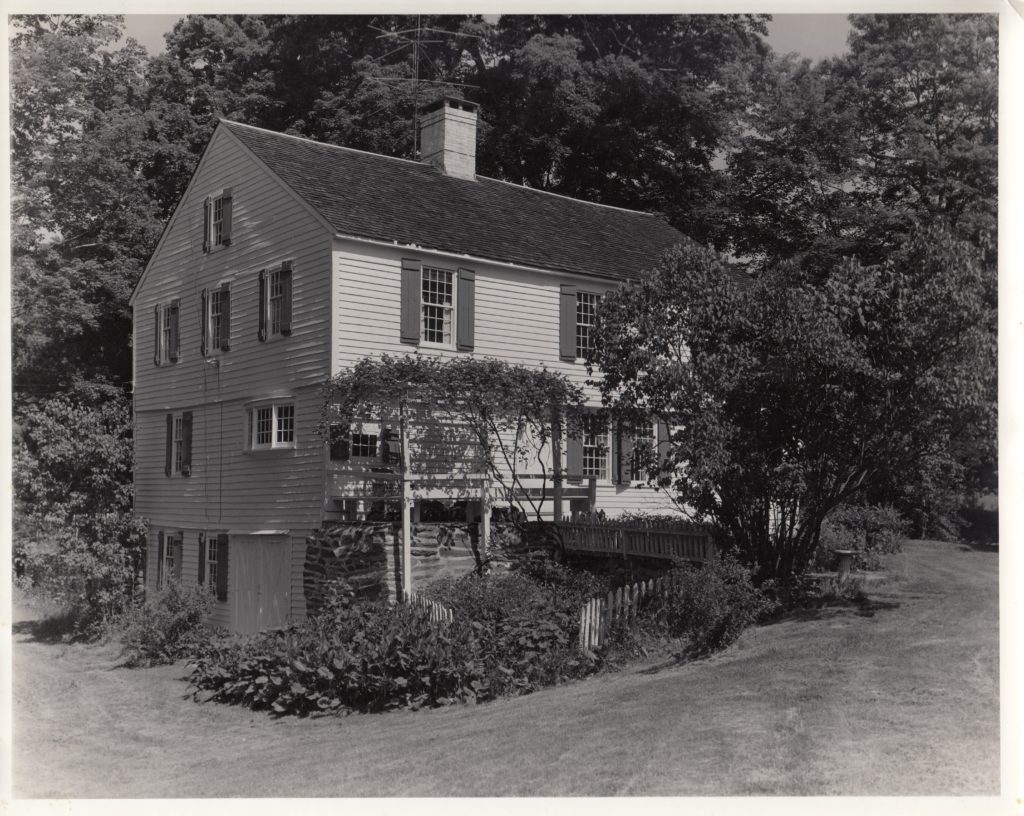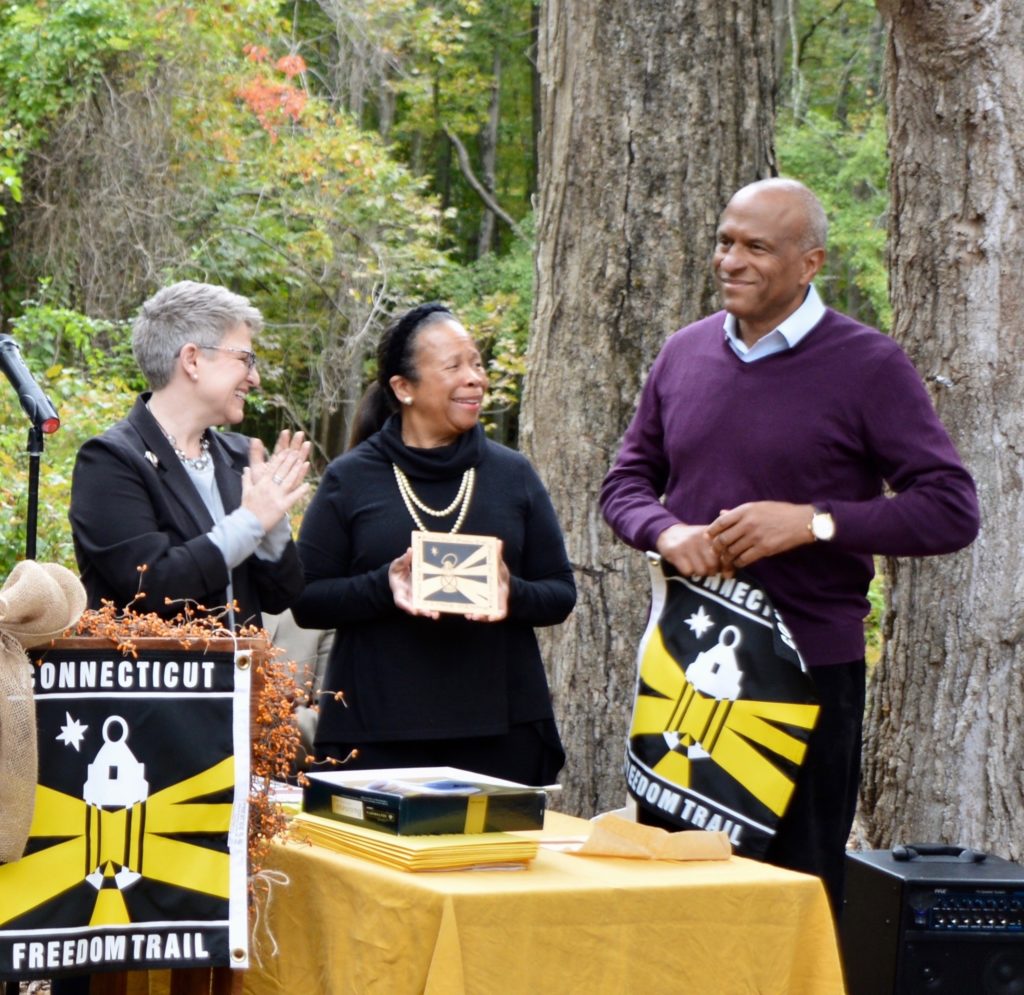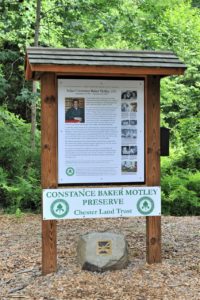
Constance Baker Motley being sworn in as the new borough president of Manhattan by Mayor Robert Wagner as her husband, Joel Motley II, and son, Joel Motley III, look on, World Telegraph and Sun, February 25, 1965. photo: Phyllis Twachtman, Library of Congress
By Marta Daniels
(c) Connecticut Explored Inc. Summer 2021
Subscribe/Buy the Issue!
In 2019 the State Historic Preservation Office formally dedicated the Chester property of Judge Constance Baker Motley as the Connecticut Freedom Trail’s 140th site. The designation includes her 1745 home (privately owned), and the nearly seven-acre Constance Baker Motley Preserve across the street. The preserve, which is surrounded by the Cockaponset State Forest, is open to the public for educational and recreational purposes.
The Connecticut Freedom Trail documents sites that embody the struggle toward freedom and human dignity, celebrate the accomplishments of the state’s African American community, and promote heritage tourism. Motley’s courageous 60-year legal career as a pioneering civil rights attorney and distinguished federal judge dramatically shaped U.S. history in human rights, women’s rights, and American jurisprudence.
Motley’s home in Chester was a secondary residence, purchased in 1965 to allow her to be closer to her family in New Haven, where she was born in 1921. On weekends, holidays, and vacations, Motley and her husband, Joel Motley II, and son Joel III, traveled to Chester from their primary residence in New York.
Before 1965 Motley spent 10 tumultuous years in the deep South helping dismantle a century of brutal Jim Crow segregation and state-sponsored racial inequality. The first female attorney for the New York-based NAACP Legal Defense and Educational Fund (LDF), she was recruited in 1946 and mentored by LDF founder and director Thurgood Marshall. Her primary work was desegregating Southern schools (after the 1954 Brown v. Board of Education decision), but she also became a key player in the Civil Rights movement. Motley was the first African American woman to argue a case before the Supreme Court; in fact she argued 200 successful civil rights cases, including 10 before the U.S. Supreme Court. “In case after case, she earned a reputation as the chief court-room tactician of the Civil Rights movement,” her 2005 New York Times obituary noted. Her legendary accomplishments are well documented, including in Gary L. Ford Jr.’s Constance Baker Motley: One Woman’s Fight for Civil Rights and Equal Justice under Law (University of Alabama Press, 2017).
Motley’s work was sometimes dangerous. The brutal Ku Klux Klan assassination of her friend and civil rights worker, Medgar Evers, in June 1963 ended her Southern work. Evers was shot in the driveway of his Jackson, Mississippi home, where Motley and her young son Joel occasionally stayed.
Returning to New York, Motley became a public servant—first, a New York state senator in 1964, and then Manhattan borough council president in 1965 (both firsts for a Black woman.) In 1966 President Lyndon Johnson tapped her for the federal bench in the Southern District of New York. After a seven-month confirmation battle, she was seated as the first Black woman on the federal court; in 1982 she was elevated to chief judge, another first.

Francis Bushnell House, 99 Cedar Lake Road, Chester, built in 1745 and purchased by Constance and Joel Motley in 1965, from Houses & History of Chester (Chester Historical Society, 1976). Chester Historical Society
In 1965 Motley and her husband purchased the 10-room colonial built in 1745 on eight acres on Cedar Lake Road and became part of the community. It is not known why she chose Chester, but she had a connection to the town through wealthy New Haven building contractor and philanthropist Clarence Blakeslee, who, in 1939, financed Motley’s college education at New York University and then her Columbia Law School degree. In 1920 Blakeslee had funded Chester’s YMCA Camp Hazen, one of the nation’s earliest integrated Ys. In her autobiography Equal Justice Under Law (Farrar, Straus, Giroux, 1998), Motley celebrates Blakeslee’s generosity, which made her life’s work possible, and noted his connection to Camp Hazen.
The late Barbara Delaney, a retired editor of Antiques Magazine, Chester Historical Society founder, and Motley’s best friend in Chester for 40 years, was the unofficial greeter of newcomers. “Integrity was her middle name,” said Delaney in a 2015 interview with me. “Connie was likeable, gracious, dignified with quiet confidence, who loved her home, the countryside, and being in Chester. … She especially loved history, and spent seven summer vacations researching and writing an outstanding paper on her 1745 house,” Delaney continued. At Delaney’s invitation, Motley became a founding trustee of the historical society in 1970.
Delaney also fondly recalls Motley’s lively dinner parties, for which she liked to cook, using vegetables from her large garden, now part of the preserve. The family also belonged to the Chester library, supported Democratic fund-raisers, and were regulars at the Lunch Box Restaurant. Motley’s Chester home became a family holiday spot, a destination for civil rights workers, and “Chester Chambers” where her New York law clerks sometimes “adjourned.”

DECD Director of Arts, Preservation and Museums Liz Shapiro (left), Constance Royster (center), and Joel Motley III (right) at a ceremony designating the Chester Land Trust’s Motley Preserve as a site on the Connecticut Freedom Trail, October 6, 2019.
photo: Skip Hubbard, Chester Historical Society
After Motley’s death in 2005, the preserve property remained in the family and the house was sold. In 2016 the Chester Land Trust purchased the 6.7-acre parcel from her estate with donations and a gift from the estate. The land trust created the preserve and added the popular “Little Rock Nine” hiking trail. The
Chester Historical Society mounted a permanent exhibit about Motley and in 2020 established the Constance Baker Motley Archive. The preserve, exhibit, and archive will ensure that Motley’s presence in the Chester community is honored in perpetuity.
Marta Daniels is a trustee of the Chester Historical Society and curator of its Constance Baker Motley Archive.
Explore!
Constance Baker Motley Preserve
100 Cedar Lake Road, Chester
chesterlandtrust.org
Chester Historical Society
9 West Main Street, Chester
chesterhistoricalsociety.org/constance-baker-motley
 Connecticut Explored received support for this publication from the State Historic Preservation Office of the Department of Economic and Community Development with funds from the Community Investment Act of the State of Connecticut.
Connecticut Explored received support for this publication from the State Historic Preservation Office of the Department of Economic and Community Development with funds from the Community Investment Act of the State of Connecticut.
GO TO NEXT STORY
GO BACK TO SUMMER 2021 CONTENTS
Subscribe/Buy the Issue!
Sign-up for our bi-weekly e-newsletter

